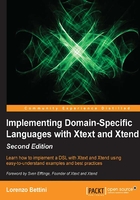
The aim of this book
Xtext comes with a lot of nice documentation; you can find it in your Eclipse help system or online at https://www.eclipse.org/Xtext/documentation/.
This book aims at being complementary to the official documentation, trying to give you enough information to start being productive in implementing DSLs with Xtext. This book will try to teach you some methodologies and best practices when using Xtext, filling some bits of information that are not present in the official documentation. This book will also focus on automatic testing methodologies so that your DSL implementation will have a solid JUnit test suite. This will help you develop your Xtext DSL faster, with better confidence, and to keep it maintainable. Most chapters will have a tutorial nature and will provide you with enough information to make sure you understand what is going on. However, the official documentation should be kept at hand to learn more details about the mechanisms we will use throughout the book.
The source codes of the examples shown in this book are available online as a Git repository at https://github.com/LorenzoBettini/packtpub-xtext-book-2nd-examples.
We strongly suggest that you try to implement the examples yourself from scratch while reading the chapters of the book. Then, you can compare your implementation with the sources you find on the Git repository.
We will maintain the source code of the examples up-to-date with respect to future releases of Xtext. In the main README file at the preceding URL, we will also document possible updates to the source code and to the contents of the book itself.
We do not commit the generated files into the Git repository, for example, the src-gen and xtend-gen folders; thus, for each example in the repository, you will need to generate the Xtext artifacts yourself, using the procedure you used when creating the first project. In the README file, we also document an automated procedure, using the Eclipse Installer Oomph, for having an Eclipse with all the required plug-ins for developing with Xtext and a workspace with all the sources of the examples and the corresponding generated files.